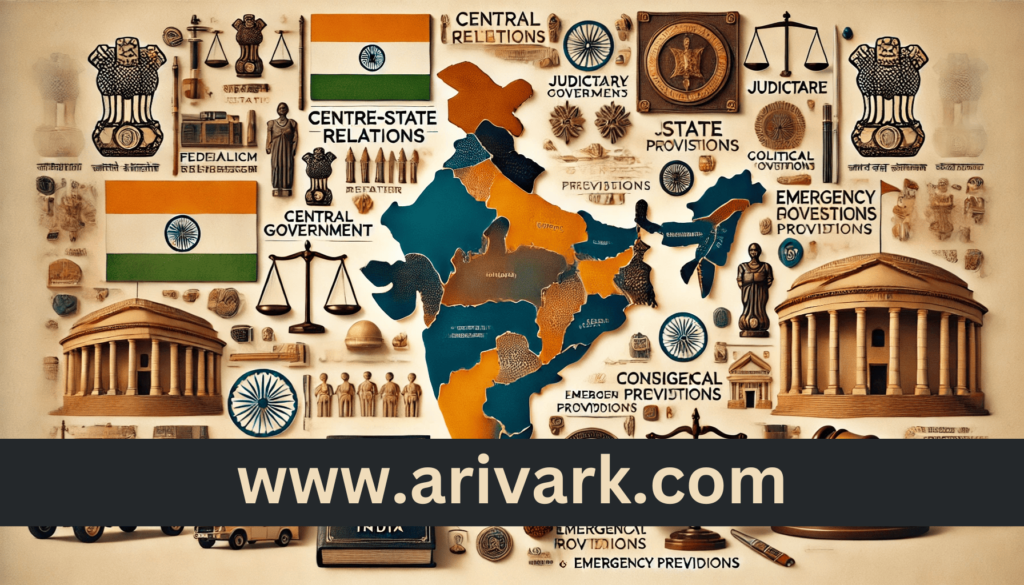Centre-State Relations and Emergency Provisions in India
India’s Federal Setup
- India is a federation with governments at the Centre and States.
- Seventh Schedule of the Constitution distributes power between Union and States.
- State governments are responsible for maintaining law and order in their respective states.
Emergency Provisions
- Found in Part XVIII of the Constitution.
- Articles 355 and 356 deal primarily with state affairs under emergency provisions.
Article 355
- Imposes duty on Centre to protect states from external aggression and internal disturbance.
- Ensures state governments operate according to the Constitution.
- Purpose: To check arbitrary or unauthorized use of Article 356.
- Scope widened by Supreme Court rulings:
- Permits all statutorily and constitutionally available actions by Union.
- Allows Union to discharge duties of protecting states.
- Ensures state governance is in accordance with Constitution.
Article 356
- Allows imposition of President’s rule if the state government cannot function as per Constitution.
- Misused several times to remove elected governments with majority.
- Supreme Court’s S.R. Bommai case (1994) restricted misuse:
- Should be imposed only for breakdown of constitutional machinery.
- Subject to judicial review.
- Should not be misused for political reasons.
Commissions’ Recommendations
- Sarkaria Commission (1987).
- National Commission to Review Working of Constitution (2002).
- Punchhi Commission (2010).
- All opined: Article 355 imposes duty and grants power to Union for effective performance.
- Article 356 should be used as a last resort in grave situations.
Manipur Situation
- Considered grave due to:
- Large-scale violence against civilians, women, and children.
- Looting of ammunition from police armory.
- Drone and missile attacks targeting civilians.
- Not viewed as ordinary breakdown of law and order.
- Article 356 not invoked due to constitutional and political expediency.
- Article 355 being used to pursue actions to restore normalcy.
இந்தியாவில் மத்திய-மாநில உறவுகள் மற்றும் அவசரகால விதிகள்
இந்தியாவின் கூட்டாட்சி அமைப்பு
- இந்தியா மத்திய மற்றும் மாநில அரசுகளைக் கொண்ட கூட்டாட்சி.
- அரசியலமைப்பின் ஏழாவது அட்டவணை மத்திய மற்றும் மாநிலங்களுக்கிடையே அதிகாரத்தை பகிர்ந்தளிக்கிறது.
- மாநில அரசுகள் தங்கள் மாநிலங்களில் சட்டம் ஒழுங்கை பராமரிக்க பொறுப்பு.
அவசரகால விதிகள்
- அரசியலமைப்பின் பகுதி XVIII-ல் காணப்படுகிறது.
- சரத்துகள் 355 மற்றும் 356 முக்கியமாக அவசரகால விதிகளின் கீழ் மாநில விவகாரங்களை கையாளுகின்றன.
சரத்து 355
- வெளிப்புற ஆக்கிரமிப்பு மற்றும் உள்நாட்டு குழப்பங்களிலிருந்து மாநிலங்களைப் பாதுகாக்க மத்திய அரசுக்கு கடமை விதிக்கிறது.
- மாநில அரசுகள் அரசியலமைப்பின்படி செயல்படுவதை உறுதி செய்கிறது.
- நோக்கம்: சரத்து 356-ன் தன்னிச்சையான அல்லது அங்கீகரிக்கப்படாத பயன்பாட்டை தடுப்பது.
- உச்சநீதிமன்ற தீர்ப்புகளால் விரிவுபடுத்தப்பட்ட நோக்கம்:
- மத்திய அரசின் அனைத்து சட்டப்பூர்வ மற்றும் அரசியலமைப்பு ரீதியாக கிடைக்கும் நடவடிக்கைகளை அனுமதிக்கிறது.
- மாநிலங்களைப் பாதுகாக்கும் கடமைகளை நிறைவேற்ற மத்திய அரசை அனுமதிக்கிறது.
- மாநில ஆட்சி அரசியலமைப்பிற்கு ஏற்ப இருப்பதை உறுதி செய்கிறது.
சரத்து 356
- மாநில அரசு அரசியலமைப்பின்படி செயல்பட முடியாவிட்டால் குடியரசுத் தலைவர் ஆட்சியை அமல்படுத்த அனுமதிக்கிறது.
- பெரும்பான்மை பெற்ற தேர்ந்தெடுக்கப்பட்ட அரசுகளை அகற்ற பல முறை தவறாகப் பயன்படுத்தப்பட்டது.
- உச்சநீதிமன்றத்தின் S.R. பொம்மை வழக்கு (1994) தவறான பயன்பாட்டை கட்டுப்படுத்தியது:
- அரசியலமைப்பு இயந்திரம் முறிவடைந்தால் மட்டுமே பயன்படுத்தப்பட வேண்டும்.
- நீதித்துறை மதிப்பாய்வுக்கு உட்பட்டது.
- அரசியல் காரணங்களுக்காக தவறாகப் பயன்படுத்தக்கூடாது.
ஆணையங்களின் பரிந்துரைகள்
- சர்க்காரியா ஆணையம் (1987).
- அரசியலமைப்பின் செயல்பாட்டை மதிப்பாய்வு செய்வதற்கான தேசிய ஆணையம் (2002).
- பஞ்சி ஆணையம் (2010).
- அனைத்தும் கருத்து: சரத்து 355 மத்திய அரசுக்கு கடமையை விதிக்கிறது மற்றும் திறம்பட செயல்பட அதிகாரம் அளிக்கிறது.
- சரத்து 356 கடுமையான சூழ்நிலைகளில் கடைசி வழியாக மட்டுமே பயன்படுத்தப்பட வேண்டும்.
மணிப்பூர் நிலைமை
- கீழ்க்கண்ட காரணங்களால் கடுமையானதாக கருதப்படுகிறது:
- பொதுமக்கள், பெண்கள், குழந்தைகளுக்கு எதிரான பெரிய அளவிலான வன்முறை.
- காவல்துறை ஆயுதக் களஞ்சியத்திலிருந்து தோட்டாக்கள் கொள்ளை.
- பொதுமக்களை இலக்காக கொண்ட டிரோன் மற்றும் ஏவுகணை தாக்குதல்கள்.
- சாதாரண சட்டம் ஒழுங்கு சீர்குலைவாக பார்க்கப்படவில்லை.
- அரசியலமைப்பு மற்றும் அரசியல் தேவைகள் காரணமாக சரத்து 356 பயன்படுத்தப்படவில்லை.
- இயல்பு நிலையை மீட்டெடுக்க சரத்து 355 பயன்படுத்தப்பட்டு நடவடிக்கைகள் மேற்கொள்ளப்படுகின்றன.
ArivArk Academy’s Social Media Handles
Official Website: www.arivark.com
Join our Telegram Channel: https://telegram.oia.bio/ArivArk
Youtube channel: https://www.youtube.com/stayupdatedtnpsc
Instagram Account: https://www.instagram.com/sandhiyaamani/?hl=en
Download our Mobile App from Play Store ✌️
Android: http://bit.ly/tnpscexampreparation
iOS: http://bit.ly/tnpsciosapp (Organization code: ZVHPT)
Laptop/PC: https://courses.arivark.com (Organization code: ZVHPT)
TNPSC Group 1 Mains Zenith Test Series 2024
Test Series Video: https://youtu.be/Zw38IjeYL4I
Schedule: https://drive.google.com/file/d/1hys_XXc7Q7qgH-IHJWTMqMUEZzUcYHNN/view?usp=drive_link
✅ Both Tamil and English Medium
✅ Detailed Where to Study
✅ Exclusive Current Affairs Material (Essay type) (Jan to Nov 2024)
✅ 21 Unit Wise Tests + Revision and Full Tests
✅ Previous Year Question Bank with Answer Key (Essay format)
✅ Decoded Syllabus PDF
✅ Possible Mains Question Bank (Based on Syllabus)
✅ Personalized Mains Feedback
✅ Starts on September 12th
For Joining, 😊Contact WhatsApp: https://wa.me/message/O5ZEBQB4G7Q6J1 (9790360921) or In Telegram @stayupdatedadmin



